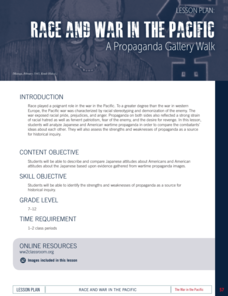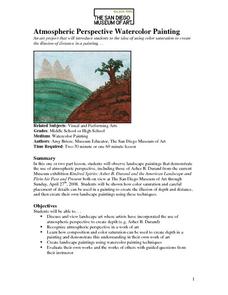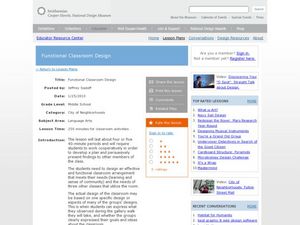Curated OER
Gallery Walk Questions on Rivers
A Gallery Walk is a technique that allows small groups to visit different stations, where they examine and discuss materials about an overarching topic. Questions about rivers and fluvial processes are available in this resource;...
National WWII Museum
Race and War in the Pacific: A Propaganda Gallery Walk
Race played a key role in the war in the Pacific during World War II. Using images from both American and Japanese sources, learners consider racial propaganda and how leaders used it to rally popular support during the conflict. After...
Curated OER
Watercolor Landscapes
Van Gogh's Starry Night and Thomas Cole's The Oxbow are featured in a watercolor lesson that encourages young artists to explore various techniques before creating their own landscape.
Overcoming Obstacles
Problem Solving at Home
The final lesson in the "Problem Solving Module" focuses on finding creative solutions to problems that might arise at home. Individuals then create a storyboard that illustrates how they would apply the six-step problem-solving process...
EngageNY
End of Unit 2 Assessment: A Hosted Gallery Walk
Speak your mind. Scholars present their claims in groups of three. They use a presentation checklist as each member takes a turn. At the end of the lesson plan, pupils complete an End of Unit 2 Assessment: Presenting a Claim and Findings...
iCivics
Propaganda: What’s the Message?
As class members progress through eight fully prepared learning stations, they will identify how bias is present in persuasive media, as well as differentiate among types of propaganda techniques like bandwagon propaganda and the use of...
Newseum
Weed Out Propaganda
Young scholars study four essential propaganda techniques: Simplification, Exploitation, Exaggeration, and Division (S.E.E.D.). Individuals select an example of propaganda from the past and present then compare how the key elements have...
San Diego Museum of Art
Atmospheric Perspective Watercolor Painting
How do artists create the illusion of depth and distance on a flat surface? Young landscape painters explore techniques like color saturation and detail placement that create atmospheric perspective.
Sargent Art
Improvisation: Dada and Surrealism
Images of works by Salvador Dali, Luis Bunuel, and Man Ray launch a study of Dada and Surrealism. After critiquing works by these and other artists, class members gather their own images and arrange them into a cohesive composition.
Classroom Law Project
What do cartoonists see in this election?
Cartoons from the 2008 Presidential election provide the text for a lesson designed to help learners understand how political cartoonists use persuasive techniques to present a point of view.
Encyclopedia Britannica
Campaign Photo Analysis
It's the art of the image! As part of a study of the 2020 Presidential race, groups analyze an image of a candidate, first from an objective point of view and then subjectively. They then prepare a presentation detailing what they...
Scholastic
Presenting Persuasively (Grades 6-8)
Teens and pre-teens are a prime target for advertisers, so how are they doing it? An interactive instructional activity highlights the strategies used by advertisers, such as visual imagery and verbal clues. Then, a short writing...
Project Articulate
Textured Landscapes with Grant Wood
Explore the world of textured landscapes through the eyes of the famous artist, Grant Wood. Here is an elementary art lesson in which scholars learn about Grant Wood's life, view his work, draw their own textured landscape, and then...
Art Educators of New Jersey
Exploring Eric Carle’s Painted Collage
Where does inspiration come from? Where do writers get their ideas? What about visual artists? A PowerPoint and a video introduce middle schoolers to children's author and illustrator Eric Carle and how he found inspiration in the work...
Curated OER
Soil Morphology
Students analyze images of five different soil types from various locations and discuss how climate, vegetation, parent material, topography, and time can contribute to soil characteristics.
Sargent Art
Symmetry: A Design Problem
As part of a study of design, young artists examine an example of a formal (symmetrical) design and then, following step-by-step directions, create their own.
Curated OER
The Amazing Maud Lewis
Students investigate cultural art from Canada by reading about Maud Lewis. For this Canadian history lesson, students identify the work of Lewis by visiting her magazine website. Students identify other heroes in Nova Scotia before...
Curated OER
Color
Students learn the effect that warm and cool colors have for those who see them used in visual art. They create a collage of variety of colors. They participate in a gallery walk to view the artwork of others.
Teaching Tolerance
Using Photographs to Teach Social Justice | Exploring Identity
Even without captions, photographs can tell amazing, involved, and complex stories. Viewers analyze two photos, consider what the pictures reveal about the subjects' identity, and determine the social justice issues represented in the...
Curated OER
Kids With Cameras Make a Difference
Students use cameras to take pictures of their community and create an exhibit to raise money. In this cameras lesson plan, students learn basic photography techniques and send their money to the "kids with cameras" project.
Curated OER
Functional Classroom Design
Students work in groups to design an effective and functional classroom. In this classroom design lesson, students discuss community and make a mental map and sketch of their classroom. Students complete a handout about the design...
Curated OER
Make Your Mark
For this sketching worksheet, students complete activities where they sketch items in the Metropolitan Museum of Art. Students complete 5 activities.
Curated OER
The Body of Human Rights
Students, in groups, draw a life-size outline of a person on paper. They then place each article of the Universal Declaration of Human Rights on a part of the body, writing the number of the article in the appropriate place (e.g.,...
























